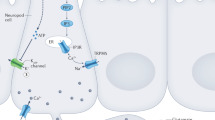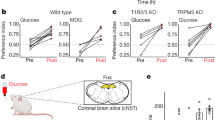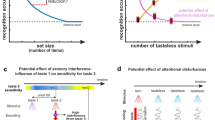Abstract
Stimuli can be discriminated without being consciously perceived and can be preferred without being remembered. Here we report a subject with a previously unknown dissociation of abilities: a strong behavioral preference for the taste of sugar over saline, despite a complete failure of recognition. The pattern of brain damage responsible for the dissociation suggests that reliable behavioral choice among tastes can occur in the absence of the gustatory cortex necessary for taste recognition.
This is a preview of subscription content, access via your institution
Access options
Subscribe to this journal
Receive 12 print issues and online access
$209.00 per year
only $17.42 per issue
Buy this article
- Purchase on Springer Link
- Instant access to full article PDF
Prices may be subject to local taxes which are calculated during checkout

Similar content being viewed by others
References
Damasio, A.R., Eslinger, P.J., Damasio, H., Van Hoesen, G.W. & Cornell, S. Arch. Neurol. 42, 252–259 (1985).
Adolphs, R. & Tranel, D. Neuropsychologia 41, 1281–1289 (2003).
Steiner, J.E. Symp. Oral Sens. Percept. 4, 254–278 (1973).
Garcia, J., Hankins, W.G. & Rusiniak, K.W. Science 185, 824–831 (1974).
Pritchard, T.C., Macaluso, D.A. & Eslinger, P.J. Behav. Neurosci. 113, 663–671 (1999).
O'Doherty, J., Rolls, E.T., Francis, S., Bowtell, R. & McGlone, F. J. Neurophysiol. 85, 1315–1321 (2001).
Zald, D.H., Lee, J.T., Fluegel, K.W. & Pardo, J.V. Brain 121, 1143–1154 (1998).
Rolls, E.T. The Brain and Emotion (Oxford University Press, New York, 1999).
Small, D.M., Jones-Gotman, M., Zatorre, R.J., Petrides, M. & Evans, A.C. J. Neurosci. 17, 5136–5142 (1997).
Pfaffmann, C., Norgren, R. & Grill, H.J. Ann. NY Acad. Sci. 290, 18–34 (1977).
Flynn, F.W. & Grill, H.J. Behav. Neurosci. 102, 934–941 (1988).
Acknowledgements
Supported by US National Institute of Mental Health grant MH067681 and US National Institute of Neurological Disorders and Stroke grant P01 NS 19632.
Author information
Authors and Affiliations
Corresponding author
Ethics declarations
Competing interests
The authors declare no competing financial interests.
Rights and permissions
About this article
Cite this article
Adolphs, R., Tranel, D., Koenigs, M. et al. Preferring one taste over another without recognizing either. Nat Neurosci 8, 860–861 (2005). https://doi.org/10.1038/nn1489
Received:
Accepted:
Published:
Issue Date:
DOI: https://doi.org/10.1038/nn1489
This article is cited by
-
Task modulated brain connectivity of the amygdala: a meta-analysis of psychophysiological interactions
Brain Structure and Function (2017)
-
Effects of intranasal oxytocin prior to encoding and retrieval on recognition memory
Psychopharmacology (2013)
-
Spatial memory tasks in rodents: what do they model?
Cell and Tissue Research (2013)
-
Olfactory dysfunction following herpetic meningoencephalitis
Journal of Neurology (2010)
-
Noradrenergic–glucocorticoid mechanisms in emotion-induced amnesia: from adaptation to disease
Psychopharmacology (2008)



